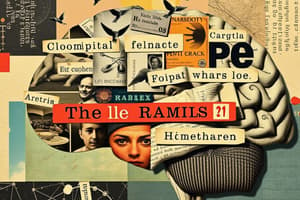Podcast
Questions and Answers
Which type of memory involves events and experiences that personally involved you?
Which type of memory involves events and experiences that personally involved you?
- Procedural memory
- Semantic memory
- Episodic memory (correct)
- Iconic memory
What is the term for the ability to retrieve information not in conscious awareness, like in a fill-in-the-blank test?
What is the term for the ability to retrieve information not in conscious awareness, like in a fill-in-the-blank test?
- Recognition
- Relearning
- Elaborative rehearsal
- Recall (correct)
If old memories interfere with the recall of new information, what type of interference is this?
If old memories interfere with the recall of new information, what type of interference is this?
- Procedural interference
- Iconic interference
- Retroactive interference (correct)
- Semantic interference
Which type of memory involves knowledge and facts that are not personal or from a personal experience?
Which type of memory involves knowledge and facts that are not personal or from a personal experience?
What does amnesia refer to?
What does amnesia refer to?
Which memory measure assesses the amount of time saved when learning material for a second time?
Which memory measure assesses the amount of time saved when learning material for a second time?
What is the function of sensory memory?
What is the function of sensory memory?
Which memory stage retains information long enough for it to be actively worked on by the brain?
Which memory stage retains information long enough for it to be actively worked on by the brain?
What does the 3 Stage model of memory consist of?
What does the 3 Stage model of memory consist of?
Which type of encoding involves remembering sounds, especially word sounds?
Which type of encoding involves remembering sounds, especially word sounds?
What is a characteristic of short-term memory?
What is a characteristic of short-term memory?
Which memory process involves getting information back out of memory?
Which memory process involves getting information back out of memory?
Flashcards are hidden until you start studying
Study Notes
Memory
- Memory is the mechanism used to create, maintain, and retrieve information about the past.
- Learning cannot occur without memory.
Types of Memory
- Flashbulb Memory: A clear memory of an emotionally significant moment or event (e.g., 9/11).
Stages of Memory
- Encoding: The process of putting information into memory.
- Storage: The maintenance of information in memory.
- Retrieval: The process of getting information back out of memory.
3-Stage Model of Memory
- Sensory Memory: Preserves information in its original sensory form for a brief time (usually a fraction of a second).
- Short-Term Memory (STM): Not permanent, retains and processes information for up to 30 seconds.
- Long-Term Memory (LTM): Stores associations among items for a long time, with unlimited capacity and duration.
Memory Phenomena
- Serial Position Effect: The tendency to remember the first and last items better than the rest due to their position.
- Visual Encoding: Remembering images and visuals.
- Acoustic Encoding: Remembering sounds, especially word sounds (e.g., rhymes).
- Iconic Memory: A photographic memory lasting for a few tenths of a second, discovered by Sperling.
Memory Loss and Forgetting
- Amnesia: The loss of memory.
- Recall: The ability to retrieve information not in conscious awareness (e.g., fill-in-the-blank test).
- Recognition: The ability to identify items previously learned (e.g., multiple-choice test).
- Relearning: A memory measure that assesses the amount of time saved when learning material for a second time.
- Proactive Interference: Old memories interfere with the recall of new information.
- Retroactive Interference: New memories interfere with the recall of old information.
Types of Long-Term Memory
- Episodic Memory: Events, self-knowledge, and experiences that personally involved the individual.
- Semantic Memory: Knowledge, facts, and information not from personal experience.
- Procedural Memory: Skill memory, knowledge of how to perform tasks (e.g., riding a bike, tying shoes).
Amnesia
- Retrograde Amnesia: Forgetting old information.
- Anterograde Amnesia: Forgetting new information.
Studying That Suits You
Use AI to generate personalized quizzes and flashcards to suit your learning preferences.



